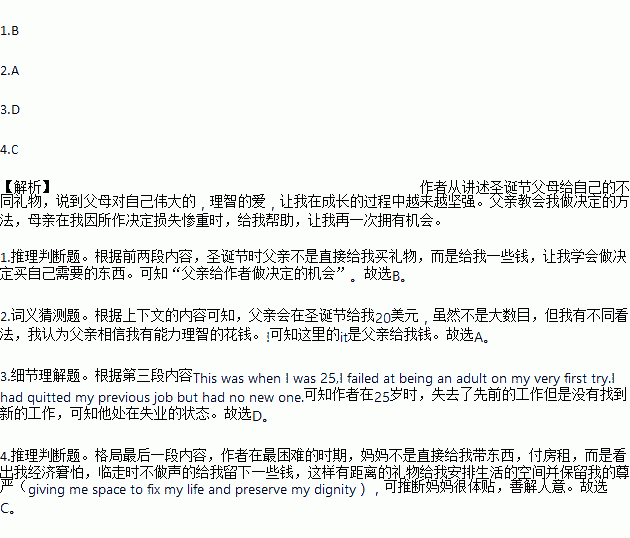题目内容
Christmas was near a season that we took seriously in our house. But a week or so before the 25th, my father would give each of his children $ 20. This was the 1970s, and $ 20 was quite a bit of money.
But I saw it differently. My father trusted me to have the smart to spend money wisely. Even better, he gave me the means to get it. On a very basic level, my father was giving me a shopping spree (狂欢) every year.. But he was also giving me charge over my own fun, trusting my ability to manage money and making me feel like a grown-up. He didn’t buy me Sherlock Holmes, but he gave me the means to walk into the bookstore and choose it for myself, so it felt like a gift from him.
My mother had a gift for giving me what I needed, usually right at the moment I needed it most. This was when I was 25, I failed at being an adult on my very first try. I had quitted my previous job but had no new one. But when my mother paid me a visit, I put on a good show, telling her I had started my own company.
My mother knew that I was trying hard and failing at that time. It wasn’t until after she left that I noticed at the foot of my bed an envelope thick with cash. She knew how desperately I needed it. She knew that had she just shown up with groceries, or offered to pay my rent, she would have made me feel much worse. The cold, hard cash meant she was helping me. And, funnily enough, the distance with which she gave the gift felt like she was giving me space to fix my life and preserve my dignity. My mother and father both did the same thing. One was giving me the means to take my own decisions, and the other was giving me a second chance when those decisions had cost me dearly.
1.What can we learn about the author from the first two paragraphs?
A. His family once celebrated Christmas happily.
B. His father gave the author chances to make decisions.
C. His best memories about Christmas were in the 1970s.
D. He used to choose books as his father’s gift on Christmas.
2.What does the underlined word “it” in Paragraph 2 refer to?
A. money offered by his father. B. father generous with money.
C. Christmas being important. D. the means of spending money.
3.When he was 25 years old, the author .
A. planned to open his company B. became interested in shows
C. gave his mother a gift D. was out of work
4.Which word can best describe the author’s mother?
A. sensitive. B. optimistic.
C. considerate. D. determined.
 暑假作业海燕出版社系列答案
暑假作业海燕出版社系列答案How do you know if the perfect house you have found is in the perfect neighborhood?When driving by on a sunny Sunday afternoon,you cannot see the true nature of the area.All too often people will fall in love with a house without taking the nearby area into consideration.This can lead to serious problems and cause you to regret the decision to buy.
Before buying a house it is wise to do some research on the area it is located in.Do you know what the crime rate is for the area?How are the schools?What is the average age of your neighbors?Is there a “party house” next door?Does the quiet street turn into a busy shortcut during the rush hour?Is there a known drug house?These things should all be considered before a final decision is made.
Making several visits to the house at various times and on different days can help you know a lot about the area.Sit in front of the house with your windows rolled down and just listen to the activity,take a walk around the block and observe the sights,sounds,and smells.Be sure to go to judge how loud things can get on a weekend evening.
You will also need to find out if the neighborhood is improving or on the decline (下降).Are stores and services closing or have new businesses been opening up?These are things that will affect the resale value of your house.Also check with local governments to discover if any developments are planned for the area.
The best advice is not to let your heart rule your head.Do your homework, and make sure your dream house is in your dream neighborhood.
Theme | Do your homework,and ensure your 1. neighborhood. | |
Problems | ·When driving by on a sunny Sunday afternoon, you cannot see the true nature of the area. ·People don’t 2. the nearby area, which can 3. serious problems and they will regret having 4. to buy the house. | |
Ways to help you buy a desirable house | Researching the area | Before making a final decision, you should consider such factors as whether the crime rate is high, and what the ages on 5. of the neighborhood are. |
6. the house | 7. down the windows, listen to the activity, walk around the block, and so on. ·Make a 8. on how loud things can get on a weekend evening. | |
Finding out if the neighborhood is improving or declining | ·Many things will have an 9. on the resale value of your house. Check whether local governments have plans to 10. the area. | |

